高中英语外研版课件 必修一 Module 3 Listening and Cultural Corner课件
文档属性
| 名称 | 高中英语外研版课件 必修一 Module 3 Listening and Cultural Corner课件 | 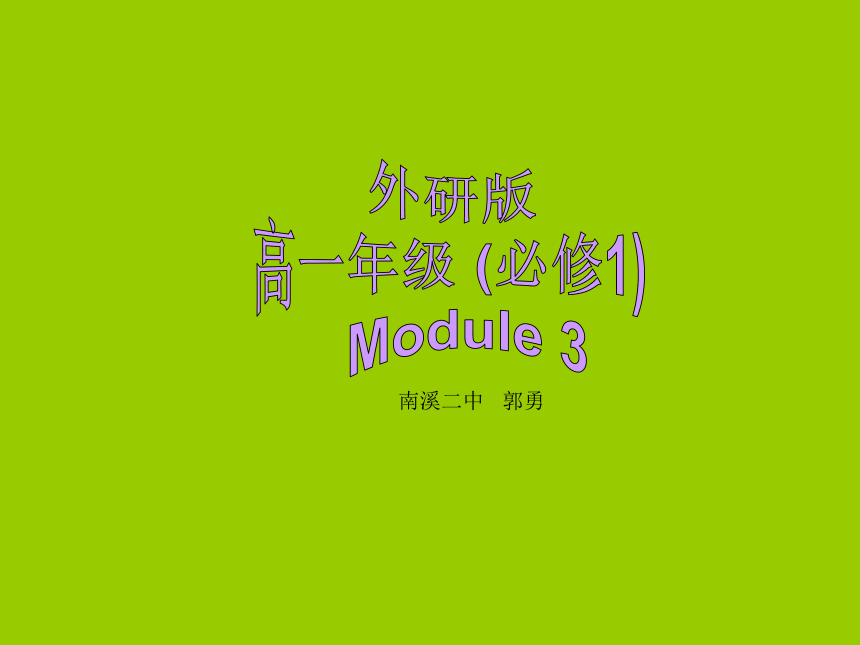 | |
| 格式 | zip | ||
| 文件大小 | 4.2MB | ||
| 资源类型 | 教案 | ||
| 版本资源 | 外研版 | ||
| 科目 | 英语 | ||
| 更新时间 | 2016-05-11 16:15:13 | ||
图片预览

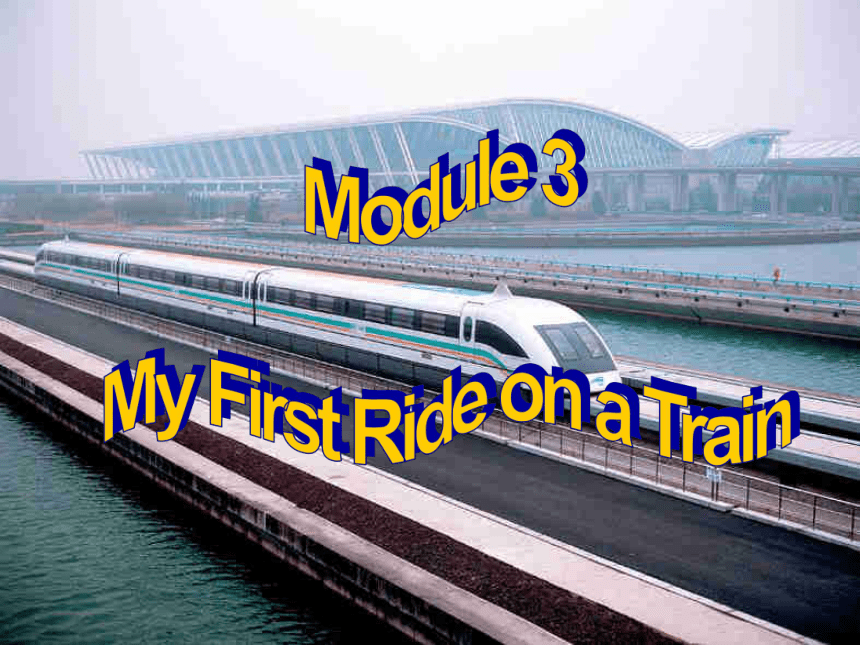
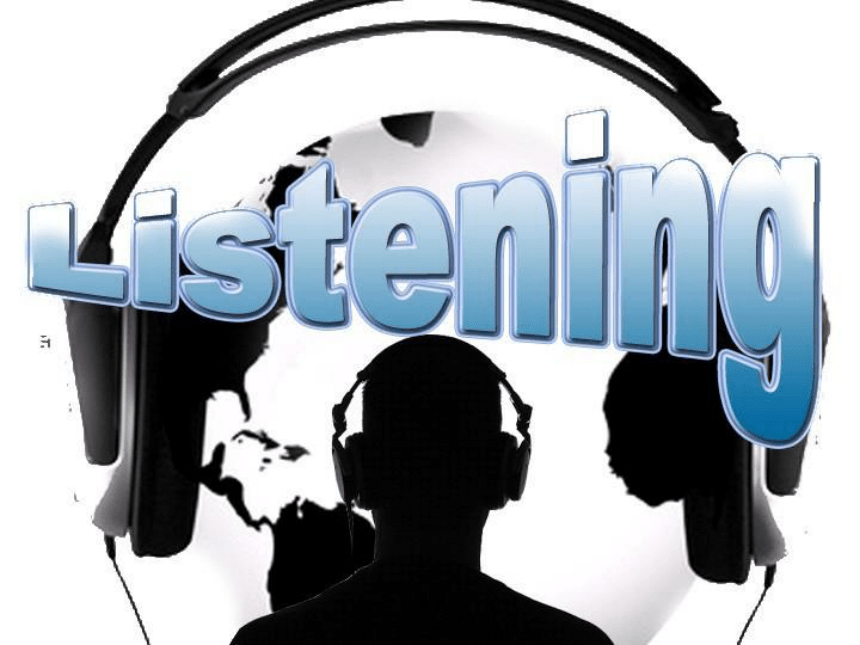
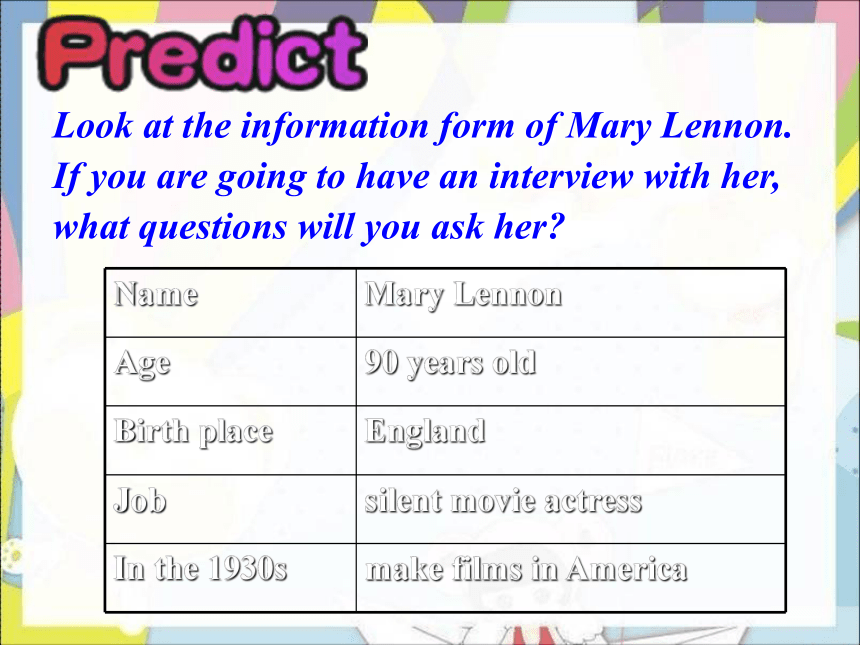

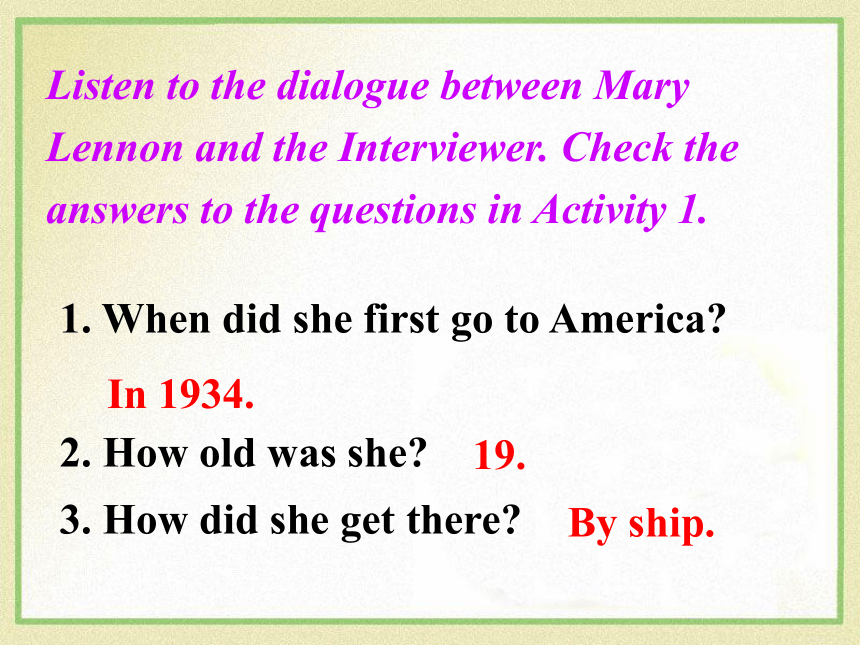
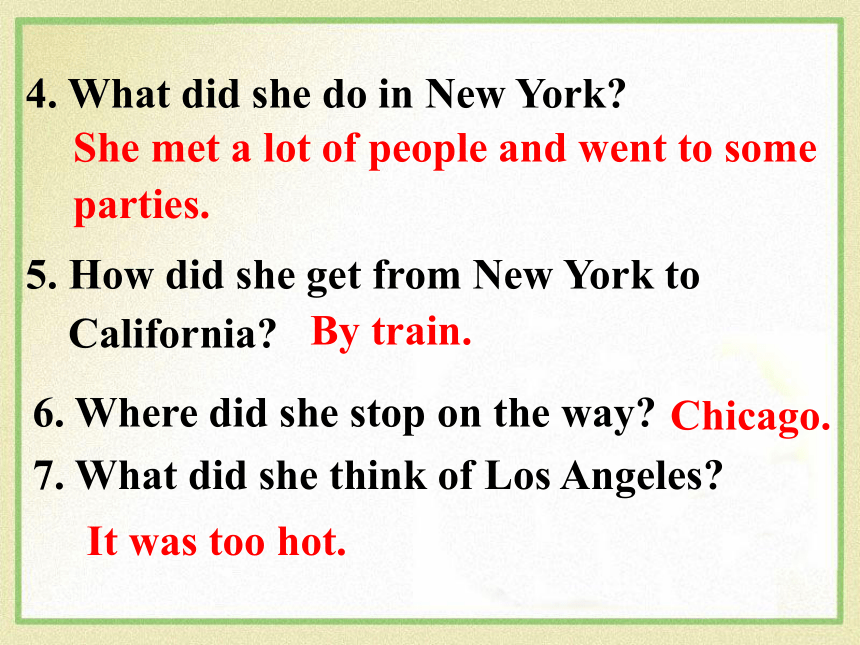
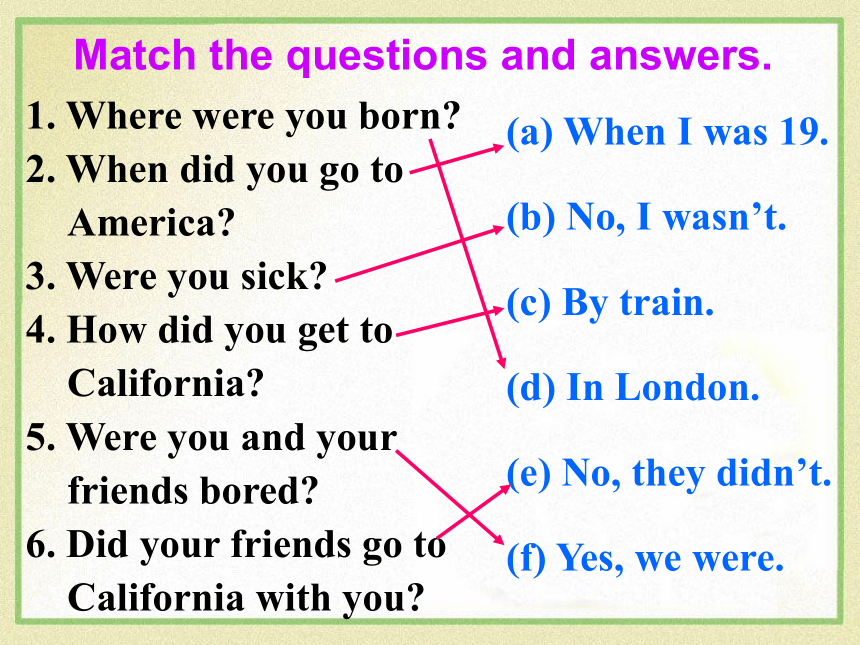


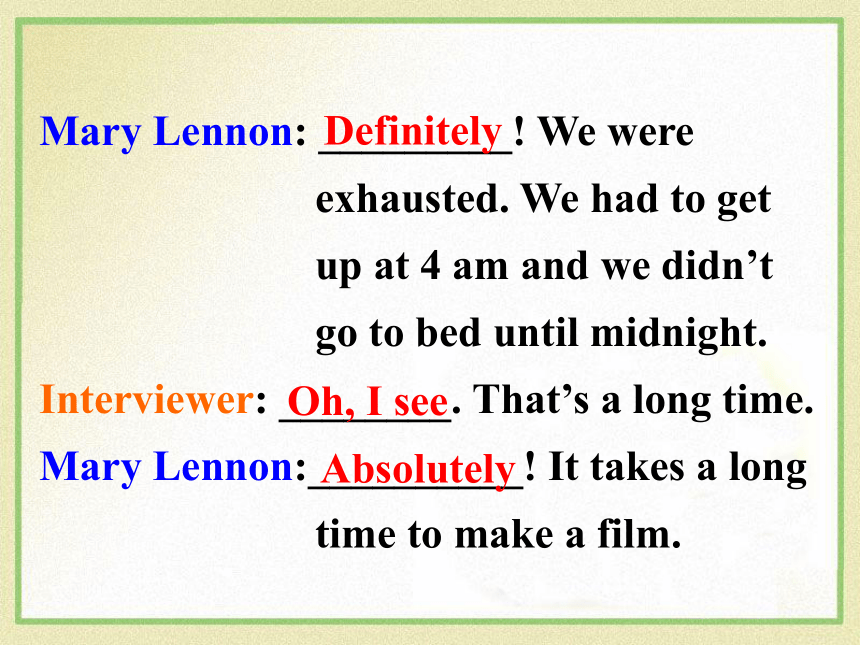
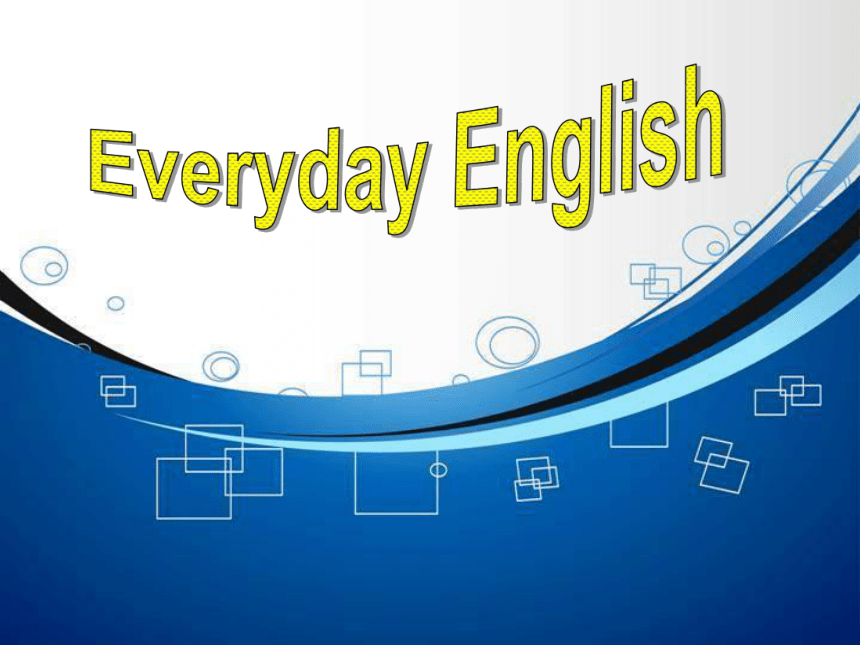
文档简介
课件31张PPT。外研版
高一年级 (必修1)
Module 3南溪二中 郭勇Module 3
My First Ride on a TrainLook at the information form of Mary Lennon. If you are going to have an interview with her, what questions will you ask her? Try to predict the answers to the following questions.When did she first go to America?
How old was she?
How did she get there?
What did she do in New York?
How did she get from New York to California?
Where did she stop on the way?
What did she think of Los Angeles? When did she first go to America?
2. How old was she?
3. How did she get there?In 1934.19.By ship.Listen to the dialogue between Mary Lennon and the Interviewer. Check the answers to the questions in Activity 1.4. What did she do in New York?She met a lot of people and went to some parties.Chicago.It was too hot.5. How did she get from New York to California? 6. Where did she stop on the way? 7. What did she think of Los Angeles?By train.Match the questions and answers.1. Where were you born?
2. When did you go to America?
3. Were you sick?
4. How did you get to California?
5. Were you and your friends bored?
6. Did your friends go to California with you?(a) When I was 19.
(b) No, I wasn’t.
(c) By train.
(d) In London.
(e) No, they didn’t.
(f) Yes, we were.Listen to the dialogue again, and complete each of the sentences. Interviewer: ______, did you enjoy making films?
Mary Lennon: ______! It was good fun! Sometimes we made three films in a week.Tell meOh yesInterviewer: _________! Weren’t you bored?
Mary Lennon: _________! It was great fun.
Interviewer: ___________? But weren’t you tired?GoodnessNot at allIs that rightMary Lennon: _________! We were exhausted. We had to get up at 4 am and we didn’t go to bed until midnight.
Interviewer: ________. That’s a long time.
Mary Lennon:__________! It takes a long time to make a film.DefinitelyOh, I seeAbsolutelyEveryday EnglishRead these expressions and answer the questions.1. Why does the interviewer use these expressions? Is it possible for her to do the interview without them?
2. What do Mary Lennon’s expressions tell you?
She’s very enthusiastic.Recall the conversation and fill in expressions.I: ________, Mary, where were you born?
M: I was born in London.
I: _________? And when did you go to America?
M: In 1934, when I was 19 years old, I went to New York.Tell me ReallyI: _____________? Did you travel by plane?
M: By plane? No, _____________! We traveled by ship!
I: ___________! of course not Goodness Is that rightComplete each sentence with one of the expressions.I: Miss, _________ ask you some questions?
M: _______! ________ what you want to know about me.
I: _________________ telling us your favorite sport?could I Oh yesTell meI=Interviewer M=Miss O’DellWould you mind M: ____________. It’s jogging. I jog anywhere I can.
I: ___, _____. Perhaps you think it’s good for your health?
M: ____________!
I: __________________ I ask something about your boyfriend?
M: ___________________ I don’t think I’d talk about it.Not at all Oh I see Absolutely Would you mind if I’m very sorry but I: Never mind! ________________ know where you live?
M: Of course. I am now living in London.Could I possiblyCultural Cornerthe maglev1. What are the main differences between a magnetically levitated train and an ordinary train?
It is faster, less noisy and uses less energy than the ordinary train.Read the passage and answer the questions.2. What are the advantages of traveling on a Maglev train?
You can travel very comfortably and quickly on it and it can save more energy for us.Some new words and phrases
magnetically (adv.)有磁性地
levitate (v.) 使……飘荡
levitation (n.) 升空飘荡之力
chancellor (n.) 德国、奥地利等国的 总理,首相 a high-speed train 高速列车
the opening ceremony of…
……的开幕式
the maglev=magnetically levitated train 磁悬浮列车2. at a speed of…; 以……的速度
reach a speed of… 达到……速度
reach a speed up to… 高达……的速度1) Traveling ___________ over 400 kilometres per hour, the train can complete the 30-kilometre journey in eight minutes.at a speed of 2) On November 12, 2003, the maglev _________________ 502 kilometres per hour.
3) The maglev can _________________ 502 kilometres per hour.reached a speed ofreach a speed up to3. 辨析attend, join, take part in
1) attend: 指出席、参加某一活动,强调出席者不起积极作用,主要指参加会议、上学、参加典礼、听演讲等。
2) join: 指参加某一团体或组织, 成为其中一员, 指参加活动时一般用 join in。3) take part in:指参加活动,并在其中起积
极作用。
1) He didn’t ______ school yesterday.
2) When did you ____ the Communist Party?
3) Every four years, athletes from different countries __________ the Olympic Games.
4) Please ____ us __ singing, will you?attendjointake part injoininWhat are the advantages and
disadvantages of the Maglev – the
fastest train in the world?
高一年级 (必修1)
Module 3南溪二中 郭勇Module 3
My First Ride on a TrainLook at the information form of Mary Lennon. If you are going to have an interview with her, what questions will you ask her? Try to predict the answers to the following questions.When did she first go to America?
How old was she?
How did she get there?
What did she do in New York?
How did she get from New York to California?
Where did she stop on the way?
What did she think of Los Angeles? When did she first go to America?
2. How old was she?
3. How did she get there?In 1934.19.By ship.Listen to the dialogue between Mary Lennon and the Interviewer. Check the answers to the questions in Activity 1.4. What did she do in New York?She met a lot of people and went to some parties.Chicago.It was too hot.5. How did she get from New York to California? 6. Where did she stop on the way? 7. What did she think of Los Angeles?By train.Match the questions and answers.1. Where were you born?
2. When did you go to America?
3. Were you sick?
4. How did you get to California?
5. Were you and your friends bored?
6. Did your friends go to California with you?(a) When I was 19.
(b) No, I wasn’t.
(c) By train.
(d) In London.
(e) No, they didn’t.
(f) Yes, we were.Listen to the dialogue again, and complete each of the sentences. Interviewer: ______, did you enjoy making films?
Mary Lennon: ______! It was good fun! Sometimes we made three films in a week.Tell meOh yesInterviewer: _________! Weren’t you bored?
Mary Lennon: _________! It was great fun.
Interviewer: ___________? But weren’t you tired?GoodnessNot at allIs that rightMary Lennon: _________! We were exhausted. We had to get up at 4 am and we didn’t go to bed until midnight.
Interviewer: ________. That’s a long time.
Mary Lennon:__________! It takes a long time to make a film.DefinitelyOh, I seeAbsolutelyEveryday EnglishRead these expressions and answer the questions.1. Why does the interviewer use these expressions? Is it possible for her to do the interview without them?
2. What do Mary Lennon’s expressions tell you?
She’s very enthusiastic.Recall the conversation and fill in expressions.I: ________, Mary, where were you born?
M: I was born in London.
I: _________? And when did you go to America?
M: In 1934, when I was 19 years old, I went to New York.Tell me ReallyI: _____________? Did you travel by plane?
M: By plane? No, _____________! We traveled by ship!
I: ___________! of course not Goodness Is that rightComplete each sentence with one of the expressions.I: Miss, _________ ask you some questions?
M: _______! ________ what you want to know about me.
I: _________________ telling us your favorite sport?could I Oh yesTell meI=Interviewer M=Miss O’DellWould you mind M: ____________. It’s jogging. I jog anywhere I can.
I: ___, _____. Perhaps you think it’s good for your health?
M: ____________!
I: __________________ I ask something about your boyfriend?
M: ___________________ I don’t think I’d talk about it.Not at all Oh I see Absolutely Would you mind if I’m very sorry but I: Never mind! ________________ know where you live?
M: Of course. I am now living in London.Could I possiblyCultural Cornerthe maglev1. What are the main differences between a magnetically levitated train and an ordinary train?
It is faster, less noisy and uses less energy than the ordinary train.Read the passage and answer the questions.2. What are the advantages of traveling on a Maglev train?
You can travel very comfortably and quickly on it and it can save more energy for us.Some new words and phrases
magnetically (adv.)有磁性地
levitate (v.) 使……飘荡
levitation (n.) 升空飘荡之力
chancellor (n.) 德国、奥地利等国的 总理,首相 a high-speed train 高速列车
the opening ceremony of…
……的开幕式
the maglev=magnetically levitated train 磁悬浮列车2. at a speed of…; 以……的速度
reach a speed of… 达到……速度
reach a speed up to… 高达……的速度1) Traveling ___________ over 400 kilometres per hour, the train can complete the 30-kilometre journey in eight minutes.at a speed of 2) On November 12, 2003, the maglev _________________ 502 kilometres per hour.
3) The maglev can _________________ 502 kilometres per hour.reached a speed ofreach a speed up to3. 辨析attend, join, take part in
1) attend: 指出席、参加某一活动,强调出席者不起积极作用,主要指参加会议、上学、参加典礼、听演讲等。
2) join: 指参加某一团体或组织, 成为其中一员, 指参加活动时一般用 join in。3) take part in:指参加活动,并在其中起积
极作用。
1) He didn’t ______ school yesterday.
2) When did you ____ the Communist Party?
3) Every four years, athletes from different countries __________ the Olympic Games.
4) Please ____ us __ singing, will you?attendjointake part injoininWhat are the advantages and
disadvantages of the Maglev – the
fastest train in the world?
